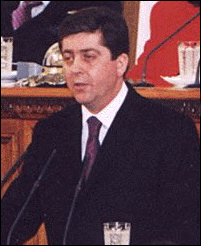 THE LEGISLATURE, THE EXECUTIVE AND THE JUDICIARY THE LEGISLATURE, THE EXECUTIVE AND THE JUDICIARY
|
Bulgaria is a parliamentary republic. The 7-th Grand National Assembly promulgated its current constitution on July 12, 1991.
The President of the Republic is elected by popular vote for a five-year term in elections called by the National Assembly. The President has an office, a secretariat, a military council, and protocol.
The incumbent President, Georgi Parvanov, was elected in November 2001 and formally assumed his duties on January 21, 2002.

The unicameral National Assembly has 240 MPs elected
by popular vote for a four-year term in elections
called by the President of the Republic. The next
parliamentary elections are scheduled for 2005. |
Justice is administered in a three-instance system: Third instance: the Supreme Court of Cassation (civil and criminal appeals) and Supreme Administrative Court (challenges to legality of the Executive's administrative acts); Second instance - the appellate courts; First instance: district and borough courts, military courts.
The Presidents of the Supreme Court of Cassation, of the Supreme Administrative Court and Prosecutor General are nominated by the Supreme Judicial Council and appointed by the President of the Republic for single seven-year terms.
The Council of Ministers (the Government) is formed by appointment of the President of the Republic by a Prime Minister-designate, nominated by the largest parliamentary group. The Prime Minister is elected and may be removed by the National Assembly. The Cabinet appointments and dismissals are proposed by the Prime Minister and voted by the National Assembly.
Currently, the Executive Power is vested with the following ministries: Ministry of Agriculture and Forestry, Ministry of Culture, Ministry of Defence, Ministry of Economy (often called mega-ministry as it was formed by the merger of the former ministries of industry, trade and tourism), Ministry of Education and Science, Ministry of Energy, Ministry of the Environment and Water Resources, Ministry of Foreign Affairs, Ministry of Health, Ministry of the Interior, Ministry of Justice and Legal Euro-integration, Ministry of Labour and Social Affairs, Ministry of Regional Development, Ministry of Transport and Telecommunications, Ministry of State Administration.
The administration of the country is divided into
9 regions (headed by a cabinet-appointed regional
governor), subdivided into 28 districts, 255 municipalities
(with directly elected municipal mayors). |

